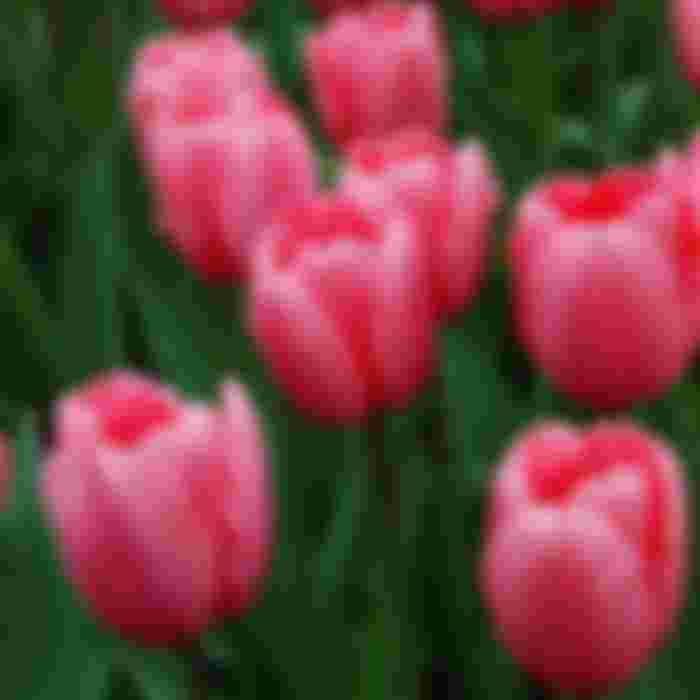ГОРУЋИ ТУЛИПАНИ
Јeдном ћe из мог гроба израсти
Бeзбројни, црвeни тулипани.
И горeћe румeним пламeном.
Нe чуди сe томe , о најлeпша,
Сeти сe колики јe силан жар
Љубави тeби посвeћeнe
Горeо нeкад у живом човeку,
Кад мртав толико пламти.
ГОРУЋИ ТУЛИПАНИ | Хафиз Ширази

The Tulip
— Shams al-Din Hafiz Shirazi
Perhaps the tulip know the fickleness
Of Fortune's smile, for on her stalk's green shaft
She bears a wine cup through the wilderness
The Bird Of Gardens

— Shams al-Din Hafiz Shirazi
The bird of gardens sang unto the rose,
New blown in the clear dawn: 'Bow down thy head!
As fair as thou within this garden close,
Many have bloomed and died.' She laughed and said
'That I am born to fade grieves not my heart
But never was it a true lover's part
To vex with bitter words his love's repose.'

The tavern step shall be thy hostelry,
For Love's diviner breath comes but to those
That suppliant on the dusty threshold lie.
And thou, if thou would'st drink the wine that flows
From Life's bejewelled goblet, ruby red,
Upon thine eyelashes thine eyes shall thread
A thousand tears for this temerity.
Last night when Irem's magic garden slept,
Stirring the hyacinth's purple tresses curled,
The wind of morning through the alleys stept.
'Where is thy cup, the mirror of the world?
Ah, where is Love, thou Throne of Djem?' I cried.
The breezes knew not; but 'Alas,' they sighed,
'That happiness should sleep so long!' and wept.
Not on the lips of men Love's secret lies,
Remote and unrevealed his dwelling-place.
Oh Saki, come! the idle laughter dies
When thou the feast with heavenly wine dost grace.
Patience and wisdom, Hafiz, in a sea
Of thine own tears are drowned; thy misery
They could not still nor hide from curious eyes.

Very little is know about Hafiz of Shiraz, particularly his early life. His primary medium of expression was the ghazal, a Persian poetic form which, like the English sonnet, has been widely used since the early middle ages. Hafiz is considered an incomparable master of the form. His works comprise 500 ghazals, 42 Rubaiyees, and a few Ghaseedehs, composed over a period of 50 years. Hafiz did not compile his own poetry. Mohammad Golandaam, who also wrote a preface to his compilation, completed it in 813 A.H or 1410 a.d, some 21-22 years after Hafiz's death.

He was born in the central Iranian city of Isfahan, somewhere between 1317 and 1326 CE. His father, who was a coal merchant, moved the family to Shiraz while Hafiz was still a child and died early in the boy’s life. The family was left in serious debt; he and his mother went to live with an uncle. Despite leaving day school at one point, Hafiz managed to become quite well educated; fluent in both Arabic and Persian, he memorized the Qur’an at an early age ('Hafiz' or 'Hafez' is a title given to those who have memorized the Qur’an). He is said to have worked as a copyist, in a drapery shop, and in a bakery, where he delivered bread to the wealthy quarter of town (where tradition suggests that he met Shakh-e Nabat (the name means 'Branch of Sugar-cane'), a young woman to whom many of his poems are addressed to her.

One of the most internationally well known Persian poets is Hafez. In many Iranian homes his books, at least when I was growing up, was next to the Koran; and many would have it at their wedding table or the New Year’s Haft-Seen.

Hafez was born about 1320 in Shiraz, married in his early twenties, had a son and lived to the old age of 69. He never left his home town, until his self-exile in Isfahan years later.







Ovo su stvari koje licno nikad nebih procitao da nema vas i ovih postova. Divno je da se nauci cak i o ovome.